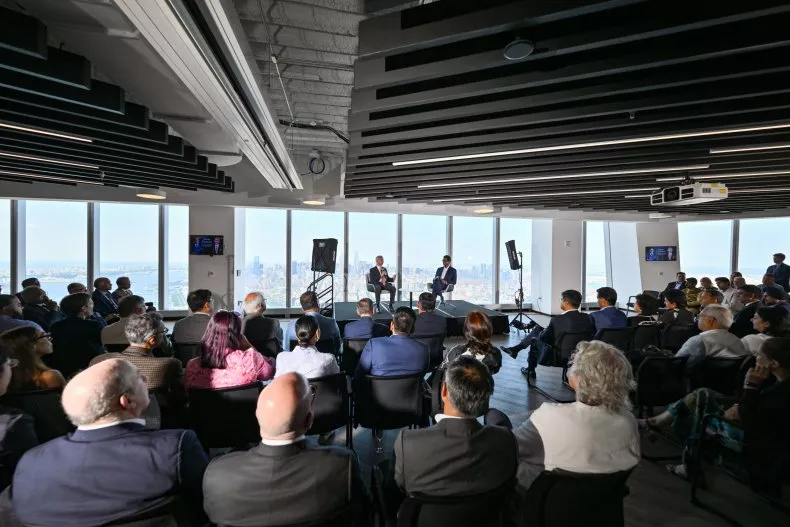India has rejected any 'offer' of talks with Pakistan on anything except ending terrorism and said New Delhi would strike again if needed.
"We are now moving to a policy of no impunity. We will not accept that the terrorists are proxies and somehow, therefore, the state is not culpable," Dr Jaishankar said at Newsweek's office in New York.
"I mean, we think it's very clear the Pakistani state is up to its eyeballs in this one," he said.
 |
| Waxes Eloquence: Dr Jaishankar |
"I think we will strike at terrorists. We will protect. We will exercise the right to defend our people. And I think that message has been made pretty clear."
Pakistani Prime Minister Shehbaz Sharif expressed his readiness for peace talks last week, saying they could address a wide range of disputes between the countries. Pakistan denies supporting cross-border terrorists.
"We are willing to hold talks on terror, but if there is an expectation that we will talk about other things while they continue their terrorism, I think that's, you know, that's not realistic," Jaishankar said.
"Terrorism cannot be a diplomatic tactic of putting a neighbor under pressure, and saying, oh, OK, come and talk to me.
You cannot be a good neighbor and be a terrorist at the same time. So, they have to end that terrorism."
India struck targets in Pakistan it said it had identified as terrorist bases on May 7 in response to the killing of 26 civilians in an attack on tourists at Pahalgam in Kashmir in April. Pakistan had denied any hand in the killings or other attacks in divided Kashmir, which it contests with India.
Pakistan struck back at India with cross-border shelling and warned that it could resort to nuclear weapons if it felt its existence was threatened.
"We are not going to yield to nuclear blackmail that you know there could be escalation, and therefore we should not do anything," Jaishankar said.
 |
| 'Assertive India' : New Normal |
The flare-up between India and Pakistan has been overshadowed globally by the war between Israel and Iran, with the United States also joining strikes against Tehran's nuclear program.
Dr Jaishankar offered India's help to bring a resolution to the crisis, highlighting its good relations with all parties and the important relationships the world's most populous country had through trade and migrant workers with the countries of the Middle East.
"We have actually very good relations with both countries, both with Israel and Iran. I mean, we would be, quite honestly, one of the few who have the ability to talk to both of them very openly, very candidly. We have tried to do that for some years now," he said.
"We know the complexity of this, of this issue, it's not something which is easily amenable to a solution. So, the long answer is, we are willing to do our part, if there's any way we can be of any help to either country to others, to the IAEA, to the United States."
 |
| Interaction at Newsweek office |
Jaishankar said the United States is bringing about a global change with a shift away from alliances and in which countries pursue their own interests more individualistically.
"The change in America's stance is very fundamental to the world order," he said.
"I would say, you are, you are seeing the emergence of a post-alliance thinking, it's not that the alliances are going to go away tomorrow, but the alliances are not going to be the fulcrum around which world politics revolves.
"You have the rise of China. You have the rise of India. You have Russia … So yes, I think we are heading for a much more individualistic world, in a way, where countries will pursue their interests more vigorously, not necessarily as collectively as before."
Dr Jaishankar's remarks during meeting with US Defense Secretary Pete Hegseth
"Now, I am here for the QUAD meeting – just had a good session with Senator Rubio, and our colleagues from Australia and Japan.
But I am also here with you at the Pentagon, because we believe that our defense partnership is today truly one of the most consequential pillars of the relationship.
It is not built merely on shared interests, but we believe really in deepening convergence of capabilities, of responsibilities, and what we do in the Indo – Pacific, we believe is absolutely crucial to its strategic stability.
There is a lot that we will and we should be talking about today, but I do particularly want to recognize that the signing of foundational agreements—especially SOSA recently, of our expanding defence trade, of our cooperation in Underwater Domain Awareness, autonomous systems, and the momentum in the Indus-X— I think all of these really speak of our deepening partnership.
The world is a complicated place, perhaps growing in its complexity, and certainly our partnership, and the contribution that we can make together would be of immense importance, not just for us, I think, but for the larger region – I would even argue, for the world."
ends




No comments:
Post a Comment